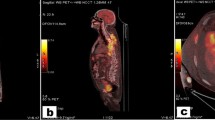Abstract
Tumor lysis syndrome (TLS) is an oncologic emergency caused by release of intracellular tumor components due to massive tumor lysis and is rare in patients with hepatocellular carcinoma (HCC). We describe a case of TLS with rupture of HCC induced by lenvatinib in a patient with advanced HCC. A 72-year-old man who presented with right upper abdominal pain was diagnosed as having advanced HCC with a high tumor burden by contrast-enhanced computed tomography and percutaneous hepatic tumor biopsy. He was started on lenvatinib 12 mg once daily when his tumor progressed despite one-shot hepatic arterial infusion chemotherapy. On day 2 of treatment with lenvatinib, he developed severe upper abdominal pain and was diagnosed as having TLS with HCC rupture by laboratory tests and contrast-enhanced computed tomography. Urgent treatment with transarterial embolization, hemodialysis, and blood transfusion therapy was successful. The patient was then restarted on oral lenvatinib at a reduced dose without recurrence of TLS. TLS is a rare potential complication of lenvatinib in patients with advanced HCC and a high tumor burden.


Similar content being viewed by others
References
Kudo M, Finn RS, Qin S, et al. Lenvatinib versus sorafenib in first-line treatment of patients with unresectable hepatocellular carcinoma: a randomised phase 3 non-inferiority trial. Lancet. 2018;391:1163–73.
Hiraoka A, Kumada T, Kariyama K, et al. Therapeutic potential of lenvatinib for unresectable hepatocellular carcinoma in clinical practice: Multicenter analysis. Hepatol Res. 2019;49:111–7.
Aibek EM, Alaa MA, Maliha K, Aram B. Tumor lysis syndrome in solid tumors: an up to date review of the literature. Rare Tumors. 2014;6:5389.
Cairo MS, Bishop M. Tumour lysis syndrome: new therapeutic strategies and classification. Br J Haematol. 2004;127:3–11.
Kudo M. Lenvatinib may drastically change the treatment landscape of hepatocellular carcinoma. Liver Cancer. 2018;7:1–19.
Rampello E, Fricia T, Malaguarnera M. The management of tumor lysis syndrome. Nat Clin Pract Oncol. 2006;3:438–47.
Huang WS, Yang CH. Sorafenib induced tumor lysis syndrome in an advanced hepatocellular carcinoma patient. World J Gastroenterol. 2009;15:4464–6.
Joshita S, Yoshizawa K, Sano K, et al. A patient with advanced hepatocellular carcinoma treated with sorafenib tosylate showed massive tumor lysis with avoidance of tumor lysis syndrome. Intern Med. 2010;49:991–4.
Imam SZ, Zahid MF, Maqbool MA. Sorafenib-induced tumor lysis syndrome in a patient with metastatic hepatocellular carcinoma. Hematol Oncol Stem Cell Ther 2018.
Lenvima capsule (hepatocellular carcinoma) List of severe adverse events. Eisai. Available at: https://medical.eisai.jp/products/LEN_C4_H/ Accessed April 13, 2020.
Sahu SK, Chawla YK, Dhiman RK, et al. Rupture of Hepatocellular Carcinoma: A Review of Literature. J Clin Exp Hepatol. 2019;9:245–56.
Acknowledgments
None.
Funding
No funding to declare.
Author information
Authors and Affiliations
Corresponding author
Ethics declarations
Conflict of interest
Yoshiaki Shimizu, Hajime Sunagozaka, Koki Yamagata, Hirokazu Hirai, Miyabi Miura, Yuichiro Yonemoto, Yoshihide Naito, Kenkei Hasatani, Jun Yoshikawa, Hiroyuki Aoyagi and Shuichi Kaneko declare that they have no conflict of interest.
Human rights
All procedures followed have been performed in accordance with the ethical standards laid down in the 1964 Declaration of Helsinki and its later amendments.
Informed consent
Informed consent was obtained from all patients for being included in the study.
Additional information
Publisher's Note
Springer Nature remains neutral with regard to jurisdictional claims in published maps and institutional affiliations.
Rights and permissions
About this article
Cite this article
Shimizu, Y., Sunagozaka, H., Yamagata, K. et al. Lenvatinib-induced tumor lysis syndrome in a patient with advanced hepatocellular carcinoma: a case report. Clin J Gastroenterol 14, 645–649 (2021). https://doi.org/10.1007/s12328-020-01306-1
Received:
Accepted:
Published:
Issue Date:
DOI: https://doi.org/10.1007/s12328-020-01306-1




